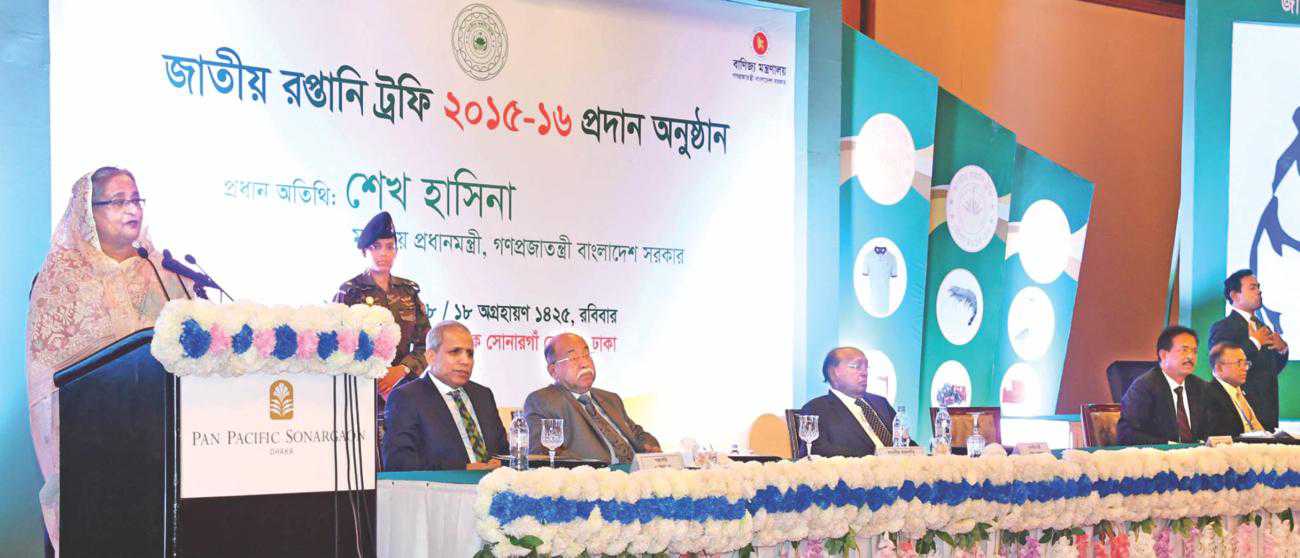Keep policies predictable

Businesspeople yesterday demanded policy continuation, a business-friendly environment and predictable regulations and energy prices to propel export growth.
“We want policy continuation. We need predictable regulatory policy and predictable energy and utility prices,” said Shafiul Islam Mohiuddin, president of the Federation of Bangladesh Chambers of Commerce and Industry.
He spoke at the national export trophy distribution ceremony at the Pan Pacific Sonargaon in Dhaka.
Prime Minister Sheikh Hasina handed over the trophies to the recipients.
Fifty six companies were awarded the trophy for their extraordinary performance in 2015-16.
Of the winners, 25 got gold trophies, 17 silver and 14 bronze.
Speaking as the chief guest, Hasina suggested businessmen diversify both markets and goods to export more.
In 2005-06, Bangladesh's merchandise export was $10.52 billion and last year it rose to $36.67 billion, she said.
“We have to bring more dynamism to exports,” she said.
The prime minister said the cabinet's approval of the export policy for 2018-2021 mainly aims at making business easier.
Mohiuddin said for the development of the economy, predictable electricity prices are needed.
“We do not want to be in the 176th position in the ease of doing business ranking.”
For easing of doing business, the government has established Bangladesh Investment Development Authority (BIDA).
“If we can create a business-friendly environment, our position will improve,” he said.
The business leader hoped all the ministries and departments of the government would help the BIDA so that it can create a one-stop service centre.
“If it happens, the BIDA will be successful and if the BIDA succeeds the business community will also succeed.
Consequently, foreign direct investment (FDI) will flow to Bangladesh as foreign investors are eagerly waiting to come to the country with investment, said Mohiuddin.
He said businesspeople are carrying out business activities despite various local and international challenges.
“The business community believes that it is possible to develop the country by increasing and expanding business and creating jobs.”
Hasina said 35 kinds of exported goods enjoyed 2 percent to 20 percent cash incentives on export receipts last year.
She urged businessmen to avail easy loans from the $3 billion Export Development Fund.
She said the government is paying a lot of incentives to attract FDI.
Now the economic diplomacy is stronger than the political diplomacy, said Hasina. She directed Bangladeshi envoys deployed abroad to take measures to increase export volume.
The prime minister said her government is developing 100 special economic zones for the industrialisation in the country.
The government is developing the railways sector to help transport goods smoothly and at lower costs, she said.
She said some 93 percent of the population has been brought under the electricity coverage.
Hasina urged exporters not to rely only on garment products.
Rather, she recommended them that they should focus more on ICT and agro-processed food items as the food market will keep expanding forever.
The prime minister urged businessmen to utilise the regional trade opportunities as the Bangladesh, Bhutan, India and Nepal (BBIN) and the Bangladesh China India and Myanmar (BCIM) trade pacts will come into force in future.
Hasina said her government has decided to go for land-based liquefied natural gas (LNG) to overcome energy crisis.
Commerce Minister Tofail Ahmed said businessmen in 28 out of 32 sectors were awarded the trophy.
He said 13 sectors will be given cash incentives on a priority basis under the new export policy.
He said 18 sectors have been identified as export sectors and nine new sectors have been brought under the cash incentive policy this year.
Last year, Bangladesh exported 744 kinds of products to 200 countries, according to the commerce minister.
In the current fiscal year, the export target has been set at $41.1 billion, including $39 billion from merchandised goods and $5 billion from services.
Source: https://www.thedailystar.net
Tags :
Previous Story
- PM: Keep environment in mind while setting up...
- PM invites Saudi businesses to invest in Bangladesh
- Bangladesh newspaper editors protest digital security law
- Bangladeshi PM inaugurates construction of China-financed rail project
- Cabinet okays gold policy easing import
- Bangladesh's fantastic GDP growth
- PM seeks IsDB’s definite actions for Rohingyas
- 'No helmet, no fuel' for Bangladesh bikers